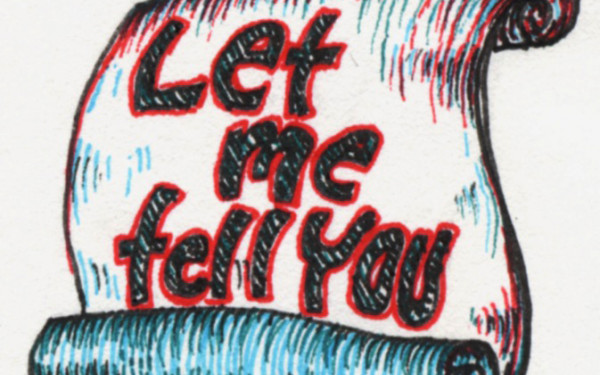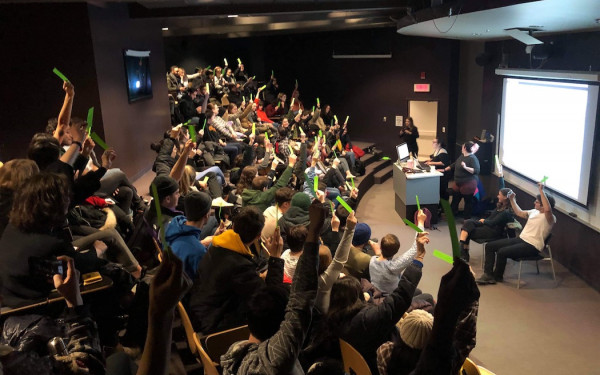Yes, Objectivity Sucks, But There’s More to It
Eradicating Objectivity Won’t Be The End All Be All of Journalism
It wasn’t until June 2020 that the perfect image I had for journalism was shattered.
Fellow students of colour took part in a call to action against Carleton University’s journalism program citing racist experiences in classrooms and lack of support from faculty members. The call to action addressed the teachings of objectivity, demanding they “should be thoroughly deconstructed to explore how the term became the industry's bedrock and who it ultimately serves and silences,” as well as acknowledge that objectivity was created by and serves white, straight, cisgender-male journalists.
The influx of anti-objectivity journalists finally speaking up came at a strange time for me. When I started my undergraduate degree in journalism at Carleton University, objectivity was ingrained into my brain. As a naïve 17-year-old, I clung to everything my professors told me with a compulsive need to prove myself. After all, I was an international student speaking accented English.
Objectivity is a paradox in the sense that it is taught in all journalism schools, yet no one seems to agree on its definition. Every scholarly definition slightly differs, but essentially, it is removing one’s biases before reporting on an issue.
“Journalism, Race and Diversity” was a class created at Carleton in response to the call to action. There was a stark difference between that class and the first journalism class I ever took. One preached objectivity while the other heavily criticized it. One told me to put my own experiences aside while the other told me to use them.
When I walked into “Journalism, Race and Diversity” and saw the first professor of colour to ever teach me journalism, I felt a calm welcome. As the semester went on, I experienced something that was completely foreign to me since I moved to Canada: a sense of belonging. My opinions were valued, I was seen, I was heard. I imagine that’s the difference between a diverse newsroom and a predominantly white one.
As the world begins to actualize the harmful effects objectivity has on marginalized journalists, it is important that we look deeper. Yes, objectivity is an outdated and undefined method of conducting journalism, but it’s not the root cause of racism in the industry. It’s a tool for racism. Racist individuals who weaponize objectivity are the main cause of censorship and racism in newsrooms.
Perhaps the most memorable example of how many newsrooms utilize objectivity is Egyptian journalist Pacinthe Mattar’s article “Objectivity is a privilege afforded to white journalists.” In her Op-Ed, Mattar recounts multiple instances where she was silenced in the name of objectivity. Her journalistic expertise and ethics came into question along with accusations of bias. Perfectly put, Mattar wrote, “There is the lack of trust toward the Black, Indigenous and other racialized people whose stories we are supposed to cover as a reflection of the world we live in.”
In his book Losing the News, journalist and Pulitzer prize winner Alex S. Jones defined objectivity as “a genuine effort to be an honest broker when it comes to news […]. That means playing it straight without favouring one side when the facts are in dispute, regardless of your own views and preferences.” However, Jones added that it “also means not trying to create the illusion of fairness by letting advocates pretend in your journalism that there is a debate about the facts when the weight of truth is clear.”
As humans, we must recognize that being completely unbiased is an unrealistic expectation. Our work can sometimes naturally take the form of advocacy when we write about our own communities or issues we strongly believe in. Journalist, activist and author of The Skin We’re In: A Year of Black Resistance, Desmond Cole explained in his book that he prioritizes being an advocate for marginalized communities over being an objective journalist.
Thanks to my professors of color, I began understanding objectivity in a different light. However, it was a class with a white professor that helped me come to the realization that white newsrooms are the cause of racism and censorship whereas objectivity was just the excuse used.
That class was solely dedicated to students producing and publishing journalism. It operated exactly like a newsroom, we had to pitch a story and have it ready soon after. With every idea I pitched, however, I had to prove that it was newsworthy enough to my professor. He gushed over other students’ articles on fashion, local wineries and thrift stores, but completely ignored my articles on immigration, the healthcare system, international students and even the systematic racism within the program.
The first opinion piece I ever wrote was an assignment for his class. He specifically stated that it didn’t need to be newsworthy and students could write about anything they want. That was my opportunity to write about something genuinely meaningful to me without being concerned with newsworthiness.
After he spent a class praising another student’s opinion piece, which she wrote about her pet, I decided to finally pitch my own idea: Muslim representation in Hollywood. Imagine my surprise when I received an email questioning how that piece would be newsworthy. When I presented that same idea in “Journalism, Race and Diversity” my Black professor praised me for it.
Although I cannot say that white professor was racist, I can, however, say he was an old white man with old white man interests. There was simply no place for me or my own interests in a sea of white classmates. Objectivity was not a dominant factor in that class. However, my professor’s interests and what he “objectively” deemed as newsworthy was why students of colour felt they needed to work harder and prove themselves against white peers.
Objectivity played no role in our struggle to succeed, my professor’s perception of “newsworthiness” did. I realized that no matter how hard I worked, my white classmates and their white stories would always trump anything I produce.
Let’s not allow this justified crusade against objectivity distract us from what the real issue is. Removing the theory of objectivity from journalism will not solve BIPOC issues within the industry. We need to look deeper and hold journalists who weaponize objectivity (or any other journalistic theory) against marginalized journalists accountable.
As Mattar said, “there’s so much more we want to talk about, so much more we want to do. But the burden is now on the Canadian media industry and its leaders to enable that work instead of questioning it.”
This article originally appeared in Volume 43, Issue 9, published January 10, 2023.







